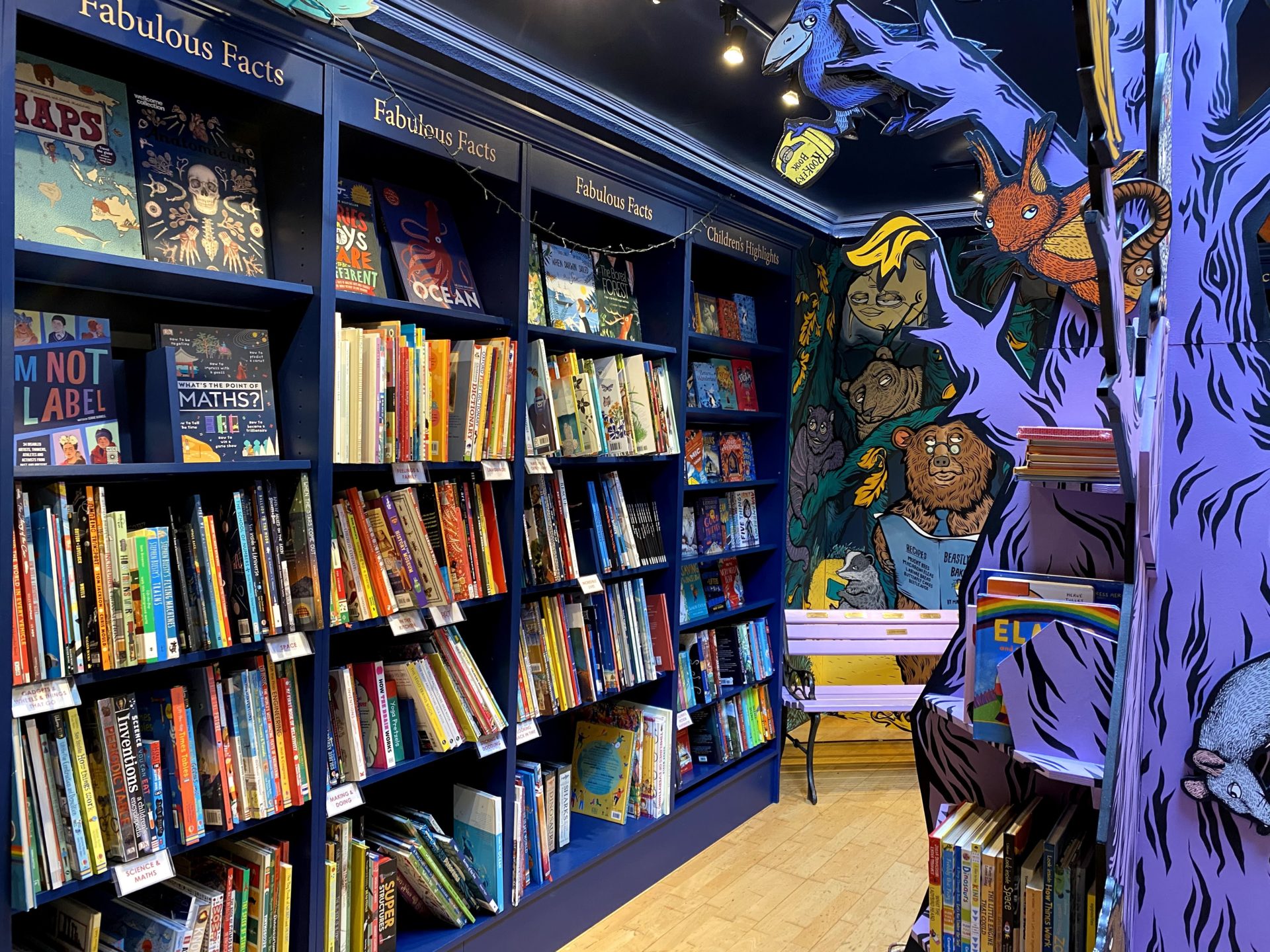
As Independent Bookshop Week kicks off on Saturday (19th June), Stephanie Bramwell-Lawes explores how booksellers, buoyed by the support of their loyal communities, have proven their resilience, passion and adaptability during the pandemic.
When I walk through the door at Warwick Books, I am immediately struck by one thing: the smell. A good smell. That intangible book smell; more invigorating to me than newly cut grass or rain fresh on the pavement. I didn’t realise how much I’d missed it.
Bookshops in England and Wales have now been open for over two months and those in Scotland for nearly eight weeks. Cause for cautious celebration after twelve torrid months of closures, staccato re-openings, more heart-breaking closures, furloughs, and relentless uncertainty. A time when the emotive experience of physical bookselling was replaced by the scrabble to stay afloat. It is a profession that has survived recessions, the rise of the Kindle and – yes – Amazon. However, it has never experienced anything quite like the Coronavirus pandemic.
“It’s been very up and down,” says Pauline Harris, co-owner of Warwick Books. “Not having human contact, meeting people, and chatting about books, and getting excited about that. To be honest, simply becoming a fulfilment centre was not very fulfilling for us.”

As an industry, Publishing talks a lot about passion. As with many creative vocations, the art of bookselling is underpinned by a desire to communicate and share fantastic stories. It’s that infectious passion that radiates from every bookseller’s pores and it is something difficult to replicate via the mediums of telephones or computers.
Yet, even in its darkest hour, books and bookselling have proved to be reassuringly resilient. In 2020 more people turned to books than ever before, in search of escapism and light relief. Though their doors remained closed, bookshops seized the opportunity for innovation and the chance to engage with their customers in new and exciting ways.
Challenged by supply chain issues during those crucial first few lockdown months, Warwick Books turned to the books on their shelves and created bespoke bundles based on their customers’ reading preferences. “I said, if thirty people ask for a bundle then I will be happy,” Harris continues. “In forty-eight hours, we had nearly one-hundred-and-fifty emails! It was overwhelming. In a way, we were recommending books through the bundles, so we still felt like booksellers.” The local coffee shop gifted artisan biscuits to the endeavour, another provided sachets of tea – a sign, perhaps, that all is not lost when it comes to High Street solidarity. Such was the initiative’s success that it will continue on as one of the shop’s mainstay features in a post-pandemic world.
For Nic Bottomley, owner of the eponymous Mr B’s Emporium in Bath, maintaining continuous channels of communication with customers was key: “One of the first things we did was ask people to send us photos of their reading piles on social media and we’d tell them which titles to read first. So, there is a sales element in that, and it keeps the conversation going.” A member of staff remained in the shop each day during lockdown to answer the phones and post orders, while their website’s Recommendation Station enabled booksellers to create tailored reading lists in accordance with customers’ personal tastes.

Mr B’s Emporium is a bookshop particularly close to my heart, having single-handedly kickstarted my career in Publishing twelve years ago. As I speak to Mr B himself, we are seated in the shop’s specially designed children’s room, The Wood Between the Words: a visual feast of kaleidoscopic artwork, cosy benches, and books stacked from floor to ceiling. It is a riotous feat of imagination with which no online shopping experience can compare. So, to address the elephant in the room … Can physical bookshops compete with the seemingly irreversible shift towards online shopping that has emerged in the last year?
“Bookshops have known how to compete for a long time,” says Bottomley. “People still want to visit those shops that offer a genuine experience, whether that’s in ambience or expertise, so I think it’s perfectly possible to compete. Probably what not all bookshops have done to date is replicate enough of that experience online.”
Enter, then, Bookshop.org – a proverbial white knight – the chance for those bookshops who haven’t had the means or opportunity, to establish an ecommerce presence online. Though still in its infancy, it has already proved to be an invaluable source of support, and a not inconsiderable revenue stream, for independent bookshops up and down the country. It is also a staunch supporter of Independent Bookshop Week (19-26 June), calling Publishers and authors to arms to promote bookshops via social media.
Not ten years ago, “digital” was a bit of a dirty word when it came to physical bookselling and it is easy to understand why. This time, however, bookshops were ready to embrace their digital outreach. Not just to embrace it, but to utilise it to its fullest potential; excelling themselves in the creation of inventive new ways to connect with customers.
In addition to its lively podcast series, Mr B’s Emporium launched a successful YouTube channel, packed full of content ranging from author interviews to children’s story time readings. The response was so positive that they intend to launch another YouTube series later this year. Sevenoaks Bookshop in Kent – this years’ Nibbies Independent Bookshop of the Year winner – added Click and Collect to its arsenal, together with energetic book clubs on Facebook. Reading subscription services grew, stoked by the fires of emerging localism from shoppers who wished to see their bookshops thrive in the face of High Street decline. As Ross Bradshaw, owner of Five Leaves bookshop in Nottingham, recently commented in an interview for the i newspaper, younger generations became “more vocal” about investing in local shops than ever before. Five Leaves’ mail-order “Mystery Boxes” were a huge hit for book enthusiasts and gift-givers alike.
Social media – the erstwhile Marmite of the internet world – also raised its’ hand to join booksellers in the COVID trenches. When Katharine Douglas, manager of Ullapool Bookshop in Scotland, appealed for support on Twitter, the shop’s online following grew from nearly 600 to over 6,000 people in a matter of days, buoyed by involvement from authors such as Ian Rankin and Jenni Fagan.
In the “real” world too, shops such as Cogito Books in Northumberland and Red Lion Books in Colchester doubled down on their commitment to customer service by hand-delivering orders to far-flung locations at all times of day and in all manners of weather. No one could ever fault booksellers’ resolve.
As bookshops become nimbler, and customers continue to browse mobile shelves in their droves, it is safe to assume that digital offerings are here to stay. Yet for booksellers, there remains nothing quite like the magic of face-to-face conversation. As the High Street continues to reopen, the two will need to form a harmonious marriage. “We need those human interactions,” Harris notes. “People really need those chats and not just a: ‘What’s going on with the weather today, you know?’”
So then, to the next six months and the ever-changing lockdown restrictions that ensure bookshops will need to remain especially fleet of foot for a while yet. It is the time of year when book festivals and author events are normally in full swing. 2021 might look a little different, but booksellers’ customer dedication remains the same.
“We won’t think about putting our own physical event on until after the current regulations end,” says Bottomley. “So, we’re just talking a little bit about that at the moment and thinking how that might look. The best part of being a bookseller is the people and the conversations you have on the shop floor with your customers. There’s nothing like having a conversation with a nine-year-old book addict on a Saturday morning. That’s what we’ve missed.”
Is there any author in particular that Warwick Books would like to welcome through its doors? “Richard Osman would be amazing!” Harris smiles. A just reward for the hard months of toil to which all booksellers can relate. The High Street may have taken a tremendous blow, but it’s clear that bookshops have an abundance of passion left in them yet. With new weapons at their fingertips, they will continue to flourish for a long time to come.
Richard Osman, over to you!
Independent Bookshop Week runs from 19th – 26th June 2021. Have a look at five ways you can support your local store here.



